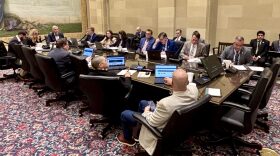Historian Allen Guelzo calls the Emancipation Proclamation “the single most sweeping presidential action in American history.” It dealt with slavery in a way the Framers during the Constitutional Convention never did, and decidedly outlined a key goal of the Union during the Civil War.
Guelzo is the director of Civil War Studies at Gettysburg College, and the author of Lincoln’s Emancipation Proclamation: The End of Slavery in America. He argues Lincoln had several options he could pursue to free the slaves.
“Each of them entailed certain risks, with no guarantee of success, and their path ahead disappeared into a murk of legal uncertainty,” Guelzo says.
In his lecture Four Roads to Emancipation: Lincoln, the Law, and the Proclamation, delivered March 10 at the University of Oklahoma’s Teach-In on the Civil War, Guelzo says Lincoln favored a gradual emancipation program.
“This would, of course, be small consolation to the slaves, since it held out a promise of freedom rather than freedom itself,” Guzelo says. “And lingering in the shadow of gradual emancipation plans was the not-very-discreet hint that much of this emancipation could be attached to plans for the transportation and colonization of the freed slaves somewhere outside the United States.”
Congress, Guelzo says, had its own ideas about what to do with freed slaves.
“The notion that slaves could be considered “contraband of war” was a nice joke at the expense of their Confederate owner,” Guelzo says. “It was too tempting for Congress not to leap onto the back of this idea and expand it into the First Confiscation Act.”
Guelzo says slaves also had their own plan for freedom.
“To use the distraction of the war, and the diversion of so much of the South’s white male population, as the opportunity simply to run away, usually into the arms of an increasingly compliant U.S. Army,” Guelzo says.
------------------------
KGOU relies on voluntary contributions from readers and listeners to further its mission of public service to Oklahoma and beyond. To contribute to our efforts, make your donation online, or contact our Membership department.







